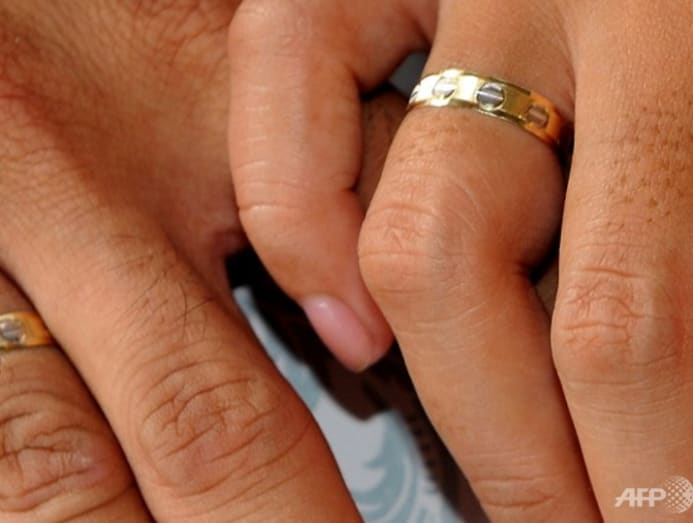Commentary: Lawyers can make a difference in reducing acrimony in divorces
The proposal to make divorces less acrimonious is welcome but lawyers will still need to play their part to make the process less bitter, says veteran family counsellor Benny Bong.

Lawyers play an important role in whether couples split amicably. (Photo: iStock/Pattanaphong Khuankaew)
SINGAPORE: I had a client who shared a painful story involving her divorce. As her marriage was breaking down, in a fit of anger, she said to her ex-husband: “I regret going through with this pregnancy”. The couple had been married for 15 years and had a daughter.
Little did she know that what she had said to her ex-husband was not only communicated to her daughter but ended up in the affidavit as a point that was used against her in the custody battle.
She was distraught as she recalled that even if she had made that statement, she didn’t think it would be used against her.
Her ex-husband’s lawyer knew that it would turn the case in his favour, despite the hurt it would cause the family in the long run.
READ: Fewer marriages in Singapore in 2020 due to COVID-19 disruptions; lowest number of divorces since 2006
This case illustrates the central role that lawyers play when marriages come apart and how lawyers advise on what should go into a lawsuit.
Aside from working out who deserves what and arguing for their clients’ best interests, lawyers also play a critical role in setting the tone of the divorce.
After all, they are there every step of the way in establishing the validity of the grounds of divorce, negotiating the division of assets, custody of children, drafting pleadings and affidavits and preparing them for any court proceedings.
It is their job to ensure they get the best outcome for their clients but there is a way for them to do it without hurting families in the process.
GOOD AND BAD APPLES
Over my 35 years of practice as a counsellor, I’ve seen different types of lawyers and the effect they have had on their clients and the divorce proceedings.

Divorcing couples often go through various stages of grief from denial to acceptance. I’ve had clients referred to me by their lawyers because they truly have their clients’ best interests at heart and want someone to support them emotionally.
These lawyers could very well have thought about the money and took on every case. But instead, they assessed if their clients were ready for a divorce and asked them to consider counselling instead. In some cases, clients would decide to stay in their marriage, thus losing the lawyer a potential client.
READ: ‘I don't think I will regret it’: Why more married couples are remaining childless
To be fair, when it comes to divorce, lawyers have a lot to deal with. They must manage the intense emotions that come with the end of a marriage. And they know emotional hurt can have a spill-over effect on the proceedings.
Many have a hard time carrying out an intensive interview to draw out the facts when the person before them is an emotional mess.
There are some who handle this challenge graciously and try their best to soothe tensions while protecting their clients’ interests. But there are also those whose “win at all costs” approach could get their client property or custody, but destroy any semblance of family.
Acrimony works against a smooth process because it causes people to feel attacked and under threat. The brain then goes into defensive overdrive, pushing the body into flight or fight mode.
Rational thinking and problem-solving go out the window and you end up with rash decisions that may do more harm than help. There have been cases of parents trying to leave the country with their offspring just to gain the upper hand in a custody battle—a decision that could scar the child for life.
READ: Commentary: Divorce, a painful, messy and contentious affair
CHANGING ROLE OF A LAWYER
In May, the Ministry of Social and Family Development (MSF) said it was seeking views from the public on measures to better support divorcing couples and their children. One suggestion was to have a no-fault option which does not require couples to prove fault such as adultery or show that they have separated for at least three years.
Another suggestion is to allow couples to jointly file for divorce, rather than placing them at odds as a plaintiff and defendant.

This is a good move. I see more couples who want a less acrimonious divorce. The effects of this on children are well-documented and there is a growing awareness of the long-term impact divorce can have on children.
If the proposals are put into policy, the role of the divorce lawyer will evolve too. With this change, they will have to focus their client's mindset on resolution rather than assigning blame. This reframing allows all parties to realise that the marriage was a poor decision, and this is a chance to correct it and move on with life.
READ: Commentary: Conflict in families has more negative outcomes on children than divorce does
READ: Commentary: Couples who stay in unhappy unions for the sake of children may end up harming them
Lawyers can now get back to their original role as professionals who advise clients about their interests and how to protect them, instead of only acting on their instructions on getting a better deal.
Like a plumber clearing a blocked pipe, they are not there to determine whose debris clogged the pipe. They are merely there to clear the pipe so the water can flow smoothly again.
With a no-fault divorce, the legal process can be seen as an administrative step in dissolving the marriage rather than years of protracted negotiations that take a toll on the mental and financial health of couples.
Lawyers can now, more than before, play a critical role in determining if the process is amicable or acrimonious.
With a deeper understanding of emotional, psychological, and interpersonal issues, they can begin to take steps towards calming the situation and reduce actions like raising their voice or using a rapid-fire style of questioning which only add to the stress of the process.
Children of divorcing couples will also benefit greatly from this. The children’s perception of the role played by lawyers can shape how they cope with this painful transition.
In some of the cases I have counselled, they see lawyers as an executioner of sorts, out to take away either parent. And in other cases, where the lawyer is seen as being more compassionate and cooperative, they see them as helping their parents get through a difficult time.
The legal process does not have to be the arena for blame, revenge, airing of grievances or getting down to the last grain of truth.
(Should the proposed no-fault divorce option be limited only to couples with children? The author and a family lawyer give their views in CNA's Heart of the Matter podcast.)
Benny Bong is a Family and Marital Therapist in private practice. He has over 35 years of experience in counselling, training and teaching. He is also the President of the Society Against Family Violence, a non-profit group he helped form 30 years ago.





